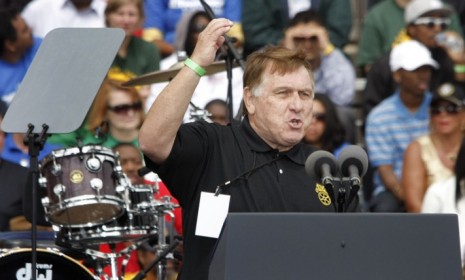James Hoffa's call to 'take out' the Tea Party: 'Inexcusable'?
Conservatives accuse the Teamsters' leader of urging pro-union voters to take violent action against Tea Party Republicans

A free daily email with the biggest news stories of the day – and the best features from TheWeek.com
You are now subscribed
Your newsletter sign-up was successful
The video: In a fiery Labor Day speech, Teamsters Union President James Hoffa accused the Tea Party of starting a "war on workers," and promised President Obama an army of voters to take the country back. (See the video below.) "We are ready to march," Hoffa said shortly before Obama took the stage at a Michigan rally Monday. "Everybody here's got to vote. If we go back, and we keep the eye on the prize, let's take these son of a bitches out and give America back to an America where we belong." Tea Party leaders quickly condemned Hoffa's remarks as an "inexcusable" call "for violence on peaceful Tea Party members." Hoffa says his rhetoric is no worse than what conservatives employ.
The reaction: "So, this is hope and change?" asks Jim Hoft at The Gateway Pundit. President Obama failed by not immediately distancing himself from this "violent and hateful rhetoric." Hold on, says Charles Johnson at Little Green Footballs. The only reason right-wing bloggers are "going ballistic" over this is that Fox News, in one of its "sleaziest, most dishonest" distortions ever, repeatedly aired an edited portion of Hoffa's remarks that made it sound like he wanted to take out Tea Party Republicans with violence instead of ballots. Indeed, this is merely "standard tough-guy political talk," says Patterico's Pontifications. But liberals who "tried to blame Sarah Palin for the shooting of Gabby Giffords" should remember this the next time they complain that conservatives are talking too tough. Watch a Fox clip below:
A free daily email with the biggest news stories of the day – and the best features from TheWeek.com
The Week
Escape your echo chamber. Get the facts behind the news, plus analysis from multiple perspectives.

Sign up for The Week's Free Newsletters
From our morning news briefing to a weekly Good News Newsletter, get the best of The Week delivered directly to your inbox.
From our morning news briefing to a weekly Good News Newsletter, get the best of The Week delivered directly to your inbox.
-
 Political cartoons for February 15
Political cartoons for February 15Cartoons Sunday's political cartoons include political ventriloquism, Europe in the middle, and more
-
 The broken water companies failing England and Wales
The broken water companies failing England and WalesExplainer With rising bills, deteriorating river health and a lack of investment, regulators face an uphill battle to stabilise the industry
-
 A thrilling foodie city in northern Japan
A thrilling foodie city in northern JapanThe Week Recommends The food scene here is ‘unspoilt’ and ‘fun’
-
 The billionaires’ wealth tax: a catastrophe for California?
The billionaires’ wealth tax: a catastrophe for California?Talking Point Peter Thiel and Larry Page preparing to change state residency
-
 Bari Weiss’ ‘60 Minutes’ scandal is about more than one report
Bari Weiss’ ‘60 Minutes’ scandal is about more than one reportIN THE SPOTLIGHT By blocking an approved segment on a controversial prison holding US deportees in El Salvador, the editor-in-chief of CBS News has become the main story
-
 Has Zohran Mamdani shown the Democrats how to win again?
Has Zohran Mamdani shown the Democrats how to win again?Today’s Big Question New York City mayoral election touted as victory for left-wing populists but moderate centrist wins elsewhere present more complex path for Democratic Party
-
 Millions turn out for anti-Trump ‘No Kings’ rallies
Millions turn out for anti-Trump ‘No Kings’ ralliesSpeed Read An estimated 7 million people participated, 2 million more than at the first ‘No Kings’ protest in June
-
 Ghislaine Maxwell: angling for a Trump pardon
Ghislaine Maxwell: angling for a Trump pardonTalking Point Convicted sex trafficker's testimony could shed new light on president's links to Jeffrey Epstein
-
 The last words and final moments of 40 presidents
The last words and final moments of 40 presidentsThe Explainer Some are eloquent quotes worthy of the holders of the highest office in the nation, and others... aren't
-
 The JFK files: the truth at last?
The JFK files: the truth at last?In The Spotlight More than 64,000 previously classified documents relating the 1963 assassination of John F. Kennedy have been released by the Trump administration
-
 'Seriously, not literally': how should the world take Donald Trump?
'Seriously, not literally': how should the world take Donald Trump?Today's big question White House rhetoric and reality look likely to become increasingly blurred